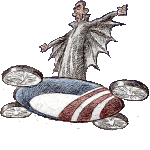|
Who What Now posted:I know it shouldn't be because I've read it before but it's still a little shocking just how blatant the fucker is with outright saying he thinks blacks are inherently inferior to whites in every way. Not blatant enough, it seems.
|
|
|
|

|
| # ? Jun 10, 2024 17:21 |
|
Hoppe isn't saying that black skin makes anyone inferior, or that you can tell who has better genes by looking at their skin. You figure out who has the better genes by looking at who has all the money. This is an objective race-neutral criterion, so let's look around the world for the richest and therefore genetically gifted individuals and let the chips fall where they may.
|
|
|
|
VitalSigns posted:Hoppe isn't saying that black skin makes anyone inferior, or that you can tell who has better genes by looking at their skin. You figure out who has the better genes by looking at who has all the money. This is an objective race-neutral criterion, so let's look around the world for the richest and therefore genetically gifted individuals and let the chips fall where they may. To build on this, it is an objective and noncontroversial view. Those who look for racism in such a race neutral argument are the real racists. Myself, I frequently attend KKK and neo-Nazi rallies just to get perspective and better understand the various points of view; you must agree that we all have opinions and it is valid to hold an opposing one. Sometimes I will speak at such a rally so that my opinion might be heard. I am not a racist.
|
|
|
|
archangelwar posted:To build on this, it is an objective and noncontroversial view. Those who look for racism in such a race neutral argument are the real racists. Myself, I frequently attend KKK and neo-Nazi rallies just to get perspective and better understand the various points of view; you must agree that we all have opinions and it is valid to hold an opposing one. Sometimes I will speak at such a rally so that my opinion might be heard. Now let me tell you how a nation of black people is impossible without being bankrolled by whites.
|
|
|
|
Who What Now posted:Now let me tell you how a nation of black people is impossible without being bankrolled by whites. Why do you keep bring up race? I have told you I do not wish to discuss race. I am merely pointing out the fact that Western European culture is clearly superior to Sub-saharan African culture. The only decent places just happen to be former colonies of Western Europe where they practice Western European culture and are in fact people from Western Europe. Apartheid was merely a way of preventing poor African culture from diluting the superior strength of Western European culture. Stop looking at me like that, Western Europe is not a race, stop talking about race 
|
|
|
|
P.S. punch all paulbots in the face *rings the jrod summoning gong*
|
|
|
|
Who What Now posted:I know it shouldn't be because I've read it before but it's still a little shocking just how blatant the fucker is with outright saying he thinks blacks are inherently inferior to whites in every way. But remember, Libertarians aren't really racist 
|
|
|
|
 I got this covered people. Also the duggar situation makes me wonder how a libertarian would solve this, oh wait don't tell me, children exist only for what their parents determine. Crowsbeak fucked around with this message at 18:26 on May 26, 2015 |
|
|
|
I feel like Jrod would be a black/white creature.
|
|
|
|
Naw I think white/blue would be better. White because well duh, and blue because of all the tears he cries.
|
|
|
|
No he'd be white and green because money.
|
|
|
|
No, I am pretty sure jrod is just white.
|
|
|
|
ToxicSlurpee posted:No he'd be white and green because money. Green like filthy fiat currency? Surely you jest. archangelwar posted:Why do you keep bring up race? I have told you I do not wish to discuss race. I am merely pointing out the fact that Western European culture is clearly superior to Sub-saharan African culture. The only decent places just happen to be former colonies of Western Europe where they practice Western European culture and are in fact people from Western Europe. Apartheid was merely a way of preventing poor African culture from diluting the superior strength of Western European culture. That's the normal defense we see from people like Rothbard, but Hoppe says poo poo like "Caucasians have, on the average, a significantly lower degree of time preference than Negroids" and gives up the whole game.
|
|
|
|
Nolanar posted:That's the normal defense we see from people like Rothbard, but Hoppe says poo poo like "Caucasians have, on the average, a significantly lower degree of time preference than Negroids" and gives up the whole game. Time preference is a discrete measure of an objective trait, and it is merely a descriptive fact that certain demographic groups hold certain values. I am just being a racial realist.
|
|
|
|
Why do I continue to post here? That is a question I sometimes ask myself. In the first place, I think that it is good practice to write on a regular basis. On the second hand, I find it fascinating the sort of people who post here. It can be hard to turn away from such a spectacle. I am going to attempt to do a "reset" of sorts to this thread. I want to restate my beliefs and central argument because I see people continually distorting and misunderstanding what I have tried to get across. Even a halfhearted attempt at genuinely comprehending my argument would be appreciated. I don't consider myself a supporter of "Capitalism". I actually abhor the word and I think it obfuscates and confuses modern audiences who don't understand that the sort of economic order that the proponent of laissez-faire supports is in stark contrast to any notion of capitalism as it has been popularly understood. Capitalism was always used as a pejorative which has connotations that are designed to elicit images of a sort of neo-Feudalism where the masses are made to be subjugated at the feet of those who have "Capital" and wealth. While Karl Marx didn't invent the term "capitalism", he shares a great responsibility for popularizing the term and subsequent Marxist and Socialist intellectuals have never failed to use the word to demonize a grab bag of Progressive targets of scorn, from Corporate power to "greed" to various accusations of exploitation of labor, and so forth. But what has this to do with the market as advocated for by principled libertarians and individualist anarchists of centuries past? Very little, if anything. In an absolute technical sense, "Capitalism" can be accurate in describing the laissez faire market. The economic definition of capitalism is merely "the private ownership of the means of production". Since libertarians don't believe in State ownership over the means of production, but rather in the right of free people to homestead unused land and freely contract with that justly acquired property, this definition of "capitalism" is accurate. The means of production WOULD be privately owned since we are not communists and are defenders of JUST private property rights. But why would we emphasize the dominance of capital over other equally valid and important aspects of a free society? Since it is an a priori truth about human action that voluntarily agreed to economic trade is expected by all parties participating of their own volition to improve their well being, then we could just as easily single out workers with equally limited but no less true labels like "laborist" or consumers with a label like "consumerist". They miss the point entirely. Singling out any aspect of a free society and putting an "-ist" or "-ism" on the end of it naturally implies that the singled out group is benefited at the expense of other groups. The other historical problem with the use of the term "Capitalism" is that the capitalists, meaning those who have acquired (either legitimately or illegitimately) significant amounts of capital and wealth, have been some of the fiercest opponents of the laissez-faire market. Anti-market capitalism has in fact been the norm rather than the exception in world history. States rarely arise in the beginning because the masses of society spontaneously rise up and agree that for practical or utilitarian reasons they must have an expansive State comprised of rulers who dominate them. States emerge in the beginning because there is a class of society who benefit from the power and cover to engage in naked exploitation that the State mythology provides. It is, in short, an effort to monopolize, cartelize and protect the immense wealth and property of powerful individuals that usually provides the impetus to form a State and subsequently expand political power over society. If capitalism is merely defined as the private ownership of the means of production, this definition also applies quite well to all manner of State dominated and totalitarian societies where capital indeed is privately owned but naked exploitation and violence is a central feature of society. That is why there are a growing number of libertarians who advocate that we drop this term entirely because it serves no useful purpose. While we might understand and be able to articulate what Ludwig von Mises meant by using the term "Capitalism", it has long outlived its purpose. I will link to several important articles to further elucidate this position through this post. The first that I feel is relevant is Sheldon Richman's article titled "Free Market Anti-Captialism, The Unknown Ideal": http://c4ss.org/content/16089 The idea of libertarianism as a quirky off-shoot of the right wing, or the Republican Party is a modern notion that is historically inaccurate. Historically, libertarianism has nothing in common with conservatism. Libertarianism is neither left nor right. However it could be argued that the intellectual tradition of libertarianism, rooted in the European Enlightenment and Classical Liberalism has much more in common with the left. Indeed, Frederic Bastiat and Lysander Spooner, to cite just two examples, were always considered a part of the left and none dared have the audacity to call them conservatives. This is where I must cite my second article, which is Murray Rothbards "Left, Right and the Prospects for Liberty". This is just an essay and is not a full length book so I encourage you to read/listen to this work as it clarifies a number of these points: Here is the ebook: https://mises.org/sites/default/files/Left%2C%20Right%2C%20and%20the%20Prospects%20for%20Liberty_4.pdf And here is an audiobook version: https://mises.org/library/left-right-and-prospects-liberty/0 The audio is only an hour or so long. This essay was written in the 1960s when Rothbard made common ground and formed coalitions with the New Left against the Vietnam War and many other important issues. He made effort to resurrect the forgotten leftist origins of libertarianism. Basically, he argued that it was always a mistake to consider "Socialism" to be a far left ideology. To the contrary, he saw libertarianism to be "far left" and conservatism, fascism, theocracy and other Statist ideologies to be "far right". The fatal error of the new "Social Democrats" that emerged at the beginning to the middle of the twentieth century was that they tried to use the State to achieve liberal ends. The socialists of past and present claim to support the goals of the classical liberals and anarchists, such as a strong middle class, protection of the environment, policing the business practices of the banks and very wealthy, supporting the labor movement, protecting the environment and things of that nature. They professed allegiance to the common man and not the oligarchs. Yet instead of seeing the State as a great fiction that only exacerbated the problems that the liberals sought to alleviate, they embraced the use of State power to achieve these ends. Rothbard calls Socialism a "confused, middle of the road ideology", a "centrist" ideology of sorts. It is really the anarchists and anti-Statists who are on the far left. Frederic Bastiat and Pierre-Joseph Proudon used to have many spirited arguments and correspondence. Proudon was a mutualist anarchist and Bastiat was a private property liberal, but nevertheless both viewed each other as fellow leftists who were explicitly anti-Statist. The disagreement came down to what is just private property and the role of interest and things of that nature. Proudon sadly believed in a version of the Labor Theory of Value which has been entirely discredited. Yet Proudon was a great mind and opposed the State with a great passion. Coming back to contemporary politics for a moment, a central difference between modern liberals and modern conservatives is in their understanding of the very nature of State action. A great deal of the modern Right-Wing actually understand that the State is force, the State is violence. It is a blunt instrument with which to force compliance, to intimidate and to crack some skulls. The great problem of course is that even with this understanding, they SUPPORT the State doing these things! They embrace the violence of the State. Conservatives use the State to bomb Iraq and "go get those Muslims". They favor being "tough on crime" and unleashing the police to lock people in cages for acting in ways they don't approve (see the War on Drugs and the actions of Mayor Guiliani in New York City). On the other hand, modern day social democrats and progressives view the State in an entirely illogical way. To them, the State is akin, or can be made to behave, like the Red Cross. The State, in their view, can be used as a benevolent provider of social services like healthcare and as an effective policer of corporate Wall Street crime. The State can solve social problems. This despite decades of evidence to the contrary. The utter failure of State action to alleviate social ills hardly need even be recounted. It is plainly obvious to those with eyes to see. As Rothbard said, Socialists are a confused bunch who are attempting to achieve liberal ends using incompatible conservative means. As my third article I wish to cite, I want to recall the great New Left historian Gabrielle Kolko's seminal "The Triumph of Conservatism": http://www.libertarianismo.org/livros/gkttoc.pdf I've brought up Kolko in the past only to be dismissed for utterly confounding reasons. Astonishingly, I was told that because Kolko was NOT a libertarian, his work could not bolster my argument. To most sane people, the mere fact that an accomplished and credentialed leftist historian like Kolko came to the same conclusion as Rothbard about the motivation and driving force behind the Progressive Era reforms would only bolster this argument. The fact that it is not only libertarians who are making this argument should lend credibility to the argument at hand, not cast doubt. The motivating factor for the Progressive Era reforms, from the creation of the Federal Reserve central bank, to the antitrust legislation and other State encroachments and interventions into the private economy were enacted at the behest of private industry as a way of monopolizing. As Kolko explains, this was an act of "Political Capitalism". The surest way to create a monopoly and protect private capital is to buy political power and create favorable regulations which benefit you but hurt your competitors. It was this Progressive Era revolution which distorted our understanding of the political spectrum. Most leftists were duped into becoming conservatives and embracing State power. The sad irony of all this is that leftists who sought to break up the power of entrenched capital supported reforms that were, from the very outset, designed to benefit entrenched Capitalists at the expense of everyone else! These confused, middle of the road socialists had attained such a coup at the end of two world wars that the right-wing for political reasons had claimed to oppose FDR's New Deal and to roll back these "Progressive Era" changes. Despite the fact that Conservatives and the Right-wing had never genuinely believed in limited government or laissez-faire markets, some in the modern day libertarian movement had formed an uneasy alliance with the right wing of the Republican Party which continues in some form today. This is the origin of the idea that libertarianism is some quirky off shoot of the Republican Party. Only those with an abysmal understanding of the history of liberal thought and the anarchist tradition could think such things. And we must not underemphasize the effect of the Koch Brothers in distorting the public perception of libertarianism through their "inside D.C" think tanks like Cato. Left libertarians like Gary Chartier like to refer to the sort of "libertarians" who populate places like The Cato Institute as "vulgar libertarians" because they tend to provide crude apologia for existing corporate and business power and capital when in reality much of this wealth is illegitimate as the economy is shot through with State privilege that would be absent in a genuinely free market laissez-faire economy. That is why I prefer to use the term "freed market" rather than "free market". Free market sounds as if you are describing something that exists and has existed in any widespread capacity in modern nation-States. Freed market implies that something must be done to "free" said market from the scourge of State granted privilege which protects Capital and existing wealth and prevents social justice from commencing through voluntary economic action which, unless otherwise impeded through law and government force, would whittle away the privileged wealth of the capitalist class into a more just configuration. I have recently been reading a book that explores the history of left libertarianism and market anarchism that I really hope you will read and comment upon. The book is called "Markets Not Capitalism: Individualist Anarchism Against Bosses, Inequality, Corporate Power, and Structural Poverty" It is a collection of short essays, both modern and historic, which chronicles the tradition of individualist anarchism and anti-capitalism. It is edited by Gary Chartier and Charles Johnson. Here is the ebook version: http://radgeek.com/gt/2011/10/Markets-Not-Capitalism-2011-Chartier-and-Johnson.pdf And here you can download the audiobook version: http://c4ss.org/content/12802 The tradition of libertarian thought and anti-statism, and the implications of the laissez faire market economy are far more wide ranging and complex that most of you have probably recognized. There are mutualist thinkers like Proudon who make an appearance in the pages of this great collection, but there are also individuals like Benjamin Tucker, Gary Chartier, Roderick Long and Carl Hess. Even modern day movement libertarians like Sheldon Richman, Charles Johnson, and Mary Ruwart contribute essays relating their views on free market anti-capitalism. Even Murray Rothbard has an essay that makes the cut. It is important to remember that prior to Rothbard's late period "paleo" phase, he was an advocate for rediscovering libertarianisms leftist routes and he contributed a great number of essays towards correcting the modern fallacies of the political spectrum. The aforementioned essay "Left, Right and the Prospects for Liberty" is an example of that. From the audiobook, I want to single out a few short chapters that I would like you to take a listen to. Gary Chartier Advocates of Freed Markets Should Oppose Capitalism http://goo.gl/5Xec8 Sheldon Richman What Laissez Faire http://goo.gl/nUE8e Roderick Long The Libertarian Case Against Intellectual Property Rights http://goo.gl/jS1LH Jeremy Weiland Let the Free Market Eat the Rich http://goo.gl/c7p88 Sheldon Richman Regulation Red Herring http://goo.gl/Lv32p Mary Ruwart Aggression and the Environment http://goo.gl/2G30x Charles Johnson The Clean Water Act Versus Clean Water http://goo.gl/Cs4UM I do hope you will listen to some of these essays. Most are quite short and to the point. My libertarians, such as Walter Block, are strictly "thin" libertarians which means that they believe that libertarianism ought to be defined as the non-aggression principle and an explicit and limited statement on what rights human beings have and when force is or is not justified, what constitutes private property, etc. Some of the above would be considered "thick" libertarians who expand their definition of libertarianism to more broadly discuss the effects of following through on laissez-faire economic policies and the dismantling of the State. However you might want to think of Chartier and someone like Walter Block as miles different in their ideology, I would strongly disagree. Gary Chartier, who spent over twenty years as a leftist but who rediscovered libertarianism and rededicated himself to the cause, is better able to explain the effects of libertarianism on society in ways that left-wing individuals ought to empathize with. But there is VERY little in "Markets Not Capitalism" that I can disagree with. I think you all are conditioned by your exposure to Ayn Rand acolytes or conservatives who posture as libertarians or who have appropriated that term to understand the actual tradition of laissez-faire market anarchism and classical liberalism. If you could come to understand the truly anti-liberal inherent nature of the State and more fully explore the ways in which free individuals under conditions of liberty and mutual exchange could far more ably achieve the social ends that are at the core of liberal thought, then I would hope you could abandon your Statism and rediscover anarchy and the primacy of the individual. A decentralized society can flourish without being violently dominated by an entrenched oligarchy of Capitalists who have purchased the political class. Remember that the State is the tool by which the political Capitalists dominate the proletariat. Without the privilege of economic regulation, cheap money financing subsidies by the central bank, and the myriad ways the law is perverted to prop up the corporate class, a freed market would ably dissipate the ill gotten property and profits of an oligarchical class. Either way, I do hope you will read, listen and consider some of the arguments made in the various essays and audio files I have linked to above. A productive discussion is just waiting to emerge on this thread, I just know it.
|
|
|
|
jrodefeld posted:Why do I continue to post here? That is a question I sometimes ask myself. In the first place, I think that it is good practice to write on a regular basis. On the second hand, I find it fascinating the sort of people who post here. It can be hard to turn away from such a spectacle. 
|
|
|
|
jrodefeld posted:Why do I continue to post here? That is a question I sometimes ask myself. In the first place, I think that it is good practice to write on a regular basis. On the second hand, I find it fascinating the sort of people who post here. It can be hard to turn away from such a spectacle. Practice more No seriously if this is what years of practice looks I shudder to think of the mountain of words you'd spew before then.
|
|
|
|
'free market anti-capitalism' I like the subtle shift to appeal to our filthy socialist leanings but you still fetishize the market so no
|
|
|
|
Yay you're back  I'm not going to read that novel you posted because it's my birthday (
|
|
|
|
jrodefeld posted:Why do I continue to post here? That is a question I sometimes ask myself. It's because you want to witness to the heathens and, market willing, get a few converts. Your shift in rhetoric isn't the worst strategy, but the problem is and has always been with the message, not the messaging.
|
|
|
|
This thread has gone into the details of your philosophy at great length, but I'm sure it's all a misunderstanding because of the word "capitalism."
|
|
|
|
jrodefeld posted:... Do you mean better off then they are at the time of the agreement, or better off than they would have been had otherwise? There's a long tradition in western philosophy of identifying the a priori with analyticity, so that it looks here like you are trying to provide a definition of 'voluntary'. Is that the case? Is the set of voluntary actions comprised of all and only actions that the agent thinks will improve their situation? If not, then what you have is not a definition, which makes it hard to see why you would think it's knowable a priori. E.g., when a highwayman jumps out of the bushes with a gun and says 'your money or your life!' Is my decision to toss him my bag of money voluntary? Why or why not? Juffo-Wup fucked around with this message at 12:49 on May 28, 2015 |
|
|
|
I think I can speak for the whole thread when I ask, "Why do you keep posting links to other people making your arguments for you? Especially since everyone has told you that they're not going to read a giant wall of Mises garbage." Seriously, only link to statistics you need to prove your point. At this point, people only click the links to see if you're copy pasting other people's arguments.
|
|
|
|
Jrod, do you stand by your previous misogynistic statement and assertion that there are women who do nothing but birth children from multiple "baby-daddies" in order to live high on the government dole? Edit: Happy Birthday, VitalSigns! You didn't even have to blow out any candles for this wish to come true. Who What Now fucked around with this message at 12:51 on May 28, 2015 |
|
|
|
Welcome back, Jrodimus. We've tried replacing you with Jrodbots, but it just isn't the same without your sheer devotion to the cause behind it. The secret ingredient was love all along!jrodefeld posted:Why do I continue to post here? That is a question I sometimes ask myself. In the first place, I think that it is good practice to write on a regular basis. On the second hand, I find it fascinating the sort of people who post here. It can be hard to turn away from such a spectacle. Buddy, there's more to practice than just doing something a lot. You also need to step back, look at what you're doing, and think about how you'd improve it. Like with your piece here. It's overlong and completely structureless. You jump from one topic to another and then back for no reason. Try an exercise to limit your length. Take each point you want to make and try to get it across in a constrained way. Try to get it across in a six word sentence, or a haiku, or the length of a tweet. Then take those limited sentences and try to put them in a sensible order. A logical flow from one idea to the next is crucial to being comprehensible. If something doesn't fit the flow, shelve it. You'll have plenty of opportunities to bring it back in future essays. Once you have your outline of short points, expand only what needs to be expanded, and keep in mind that we can respond and ask questions if something needs elaboration. A short but less thorough argument encourages interaction, while a long and exhausting one only encourages people to scroll on by. jrodefeld posted:I am going to attempt to do a "reset" of sorts to this thread. To be blunt, that ain't gonna work. jrodefeld posted:The idea of libertarianism as a quirky off-shoot of the right wing, or the Republican Party is a modern notion that is historically inaccurate. Historically, libertarianism has nothing in common with conservatism. Libertarianism is neither left nor right. However it could be argued that the intellectual tradition of libertarianism, rooted in the European Enlightenment and Classical Liberalism has much more in common with the left. Indeed, Frederic Bastiat and Lysander Spooner, to cite just two examples, were always considered a part of the left and none dared have the audacity to call them conservatives. "Private property capitalism and egalitarian multiculturalism are as unlikely a combination as socialism and cultural conservatism. And in trying to combine what cannot be combined, much of the modern libertarian movement actually contributed to the further erosion of private property rights (just as much of contemporary conservatism contributed to the erosion of families and traditional morals). What the countercultural libertarians failed to recognize, and what true libertarians cannot emphasize enough, is that the restoration of private property rights and laissez-faire economics implies a sharp and drastic increase in social discrimination and will swiftly eliminate most if not all of the multicultural-egalitarian life style experiments so close to the heart of left libertarians. In other words, libertarians must be radical and uncompromising conservatives." -Hans Hermann Hoppe It's always entertaining to me that you cite Bastiat and Spooner as totes libertarian thinkers you guys, but then when you start quoting people on what libertarians actually think, they're nowhere to be found! It's almost as if they're just decoys for you. jrodefeld posted:Rothbard calls Socialism a "confused, middle of the road ideology", a "centrist" ideology of sorts. It is really the anarchists and anti-Statists who are on the far left. I'm going to use this sentence as an example of a greater trend in your essays (See? Conciseness!). You seem to believe that convincing us that your philosophy is on "the left" will somehow make us more sympathetic to it, presumably because most of us identify as "leftist." Unfortunately for you, that's not how it works. Our attachment is to our beliefs in themselves, not to a label on the left-right axis. Stalinism is unquestionably part of The Left, but that doesn't mean we think it's a belief system that deserves respect. jrodefeld posted:I do hope you will listen to some of these essays. gently caress that and gently caress you. If you have a point you want to make, make it yourself. Bring in (short! Shooooort!) quotes to bolster your argument if you want, but "here's a dozen links on a hundred different topics" won't bring about meaningful discussion any more than your ten thousand word stream of consciousness pseudo-essays. jrodefeld posted:A productive discussion is just waiting to emerge on this thread, I just know it. Right back at ya, dick-butt.
|
|
|
Juffo-Wup posted:E.g., when a highwayman jumps out of the bushes with a gun and says 'your money or your life!' Is my decision to toss him my bag of money voluntary? Why or why not? Thomas Hobbes amd Locke need to know this Jrod, get on it.
|
|
|
|
|
Hey, Jrod, we've had productive discussions in this thread. You are the common element that makes discussions unproductive. Go back and answer your critics from earlier, you coward.
|
|
|
|
Disinterested posted:
Pretty sure I stole the hypothetical from Hobbes, in fact. Still jrod-style libertarianism seems to rest on some substantial account of free will, but I haven't been able to figure out what it could be.
|
|
|
|
JROD here is a book you should read: Walter Rodney, How Europe Underdeveloped Africa. Until you've read it I will simply assume that you have a higher time preference for spouting your own bullshit than actually learning anything and we all know what that means.
|
|
|
|
Crowsbeak posted:
I cannot believe this actually loving worked.
|
|
|
|
Juffo-Wup posted:E.g., when a highwayman jumps out of the bushes with a gun and says 'your money or your life!' Is my decision to toss him my bag of money voluntary? Why or why not? A man with a gun demanding your money? You mean just like the government?!?!
|
|
|
|
Oh, and Jrod, I just thought of something else that might help improve people's reception of your posts: I'm being serious. This is a whole big forum, and you only posting on this one topic puts you on the same level as While I'm at it, maybe loosen up a little? I know it's a cliche, but this is an internet comedy forum. A more conversational posting style, and maybe a couple solid burns on other posters, would do wonders to humanize you. TLM3101 posted:I cannot believe this actually loving worked. Oh man. 
|
|
|
Juffo-Wup posted:Pretty sure I stole the hypothetical from Hobbes, in fact. Still jrod-style libertarianism seems to rest on some substantial account of free will, but I haven't been able to figure out what it could be. Yeah, it is classically Hobbes's example (he famously says you will not just hand over your money willingly, you will find that you do it most willingly). Locke, unlike Hobbes, thinks that it is possible for the will, and not just the body, to be coerced. Although on a deeper level Hobbes was a determinist anyway. One doesn't require this kind of free will argument to be a libertarian, of course, so it's a bit mystifying why certain types of libertarian are so insistent on these models. If one wants to understand the wacky philosophy at work, see this: https://mises.org/library/mantle-science#2 The argument of which is laughable really. Man is by nature not determined - therefore man is not determined.
|
|
|
|
|
... An article by Sheldon Richan, you say, that you'd like Our reactions to in an effort to 'reset the thread'? You know, that actually sound famil- Oh, no, surely not. jrodefeld posted:I'd really like to hear your reaction to this article which was written by Sheldon Richman, called "Libertarian Left: Free-market anti-capitalism, the unknown ideal" You've already posted this and had it soundly rejected! What, did you think my memory didn't extend to the mythical before-time of November last year or somehting?
|
|
|
|
BUG JUG posted:JROD here is a book you should read: Walter Rodney, How Europe Underdeveloped Africa. Until you've read it I will simply assume that you have a higher time preference for spouting your own bullshit than actually learning anything and we all know what that means. I actually had meant to ask what you all thought I ought to read. I am actually being sincere here. I get criticized for posting links to articles or suggestions for books I think you should read. I'd genuinely like to know what books you recommend would convert me to your way of thinking. What influenced you the most? Which political or economic books are you most impressed by? If you asked me, I could probably list off a good thirty or so books (not all of which are explicitly libertarian) that I feel are extremely persuasive. After all, if this little exercise is worth anything, we might as well learn something of value from the other side. You listed off a book title with no context on why I ought to read it. From the Amazon description, I understand that the author is a Marxist and I have read a synopsis of the book. I still have no idea why you think this book is a great refutation of libertarianism, if indeed that is what you are claiming. If the central thesis is that Africa is and has remained underdeveloped at least in part because of colonialism, foreign intervention and exploitation, I don't necessarily have any reason to refute that. If you'd care to elaborate on what value this book provides, I'm all ears. I'd like to add that the audio files I listed in my previous post are from relatively short chapters, many of which are no longer than fifteen to twenty minutes. I did a fairly good job summing up a lot of the themes but it certainly would make it easier to communicate if any of you bothered to learn a little more about the arguments made my Gary Chartier and others like him.
|
|
|
|
Nolanar posted:Oh, and Jrod, I just thought of something else that might help improve people's reception of your posts: The point if this
|
|
|
|
Political Whores posted:The point if this Only if he turns everything to child market advocacy, I'd assume!
|
|
|
|
Disinterested posted:Yeah, it is classically Hobbes's example (he famously says you will not just hand over your money willingly, you will find that you do it most willingly). Locke, unlike Hobbes, thinks that it is possible for the will, and not just the body, to be coerced. Although on a deeper level Hobbes was a determinist anyway. Holy poo poo, that is the worst defense of libertarian (in both senses! Ha!) free will I have ever seen. You seem to have a broad knowledge of Hobbes, but if anyone else is interested, Cambridge's 'Hobbes and Bramhall on Liberty and Necessity' is really neat as far as early modern debates on free will go. (Also, more than being a determinist, Hobbes was a necessitarian, and, hilariously, pretty much everyone hated him for it.)
|
|
|
|
The Mattybee posted:Only if he turns everything to child market advocacy, I'd assume! I'm not really spoiling anything here when I say that is exactly what will happen. Jrod can't not try to turn every conversation he has into evangelizing his market god, zealous missionary that he is.
|
|
|
|

|
| # ? Jun 10, 2024 17:21 |
|
jrodefeld posted:I'd like to add that the audio files I listed in my previous post are from relatively short chapters, many of which are no longer than fifteen to twenty minutes. I did a fairly good job summing up a lot of the themes but it certainly would make it easier to communicate if any of you bothered to learn a little more about the arguments made my Gary Chartier and others like him. Oh, so you only posted two hours of loving blathering for us to listen to. Why, that's hardly anything at all!
|
|
|

































